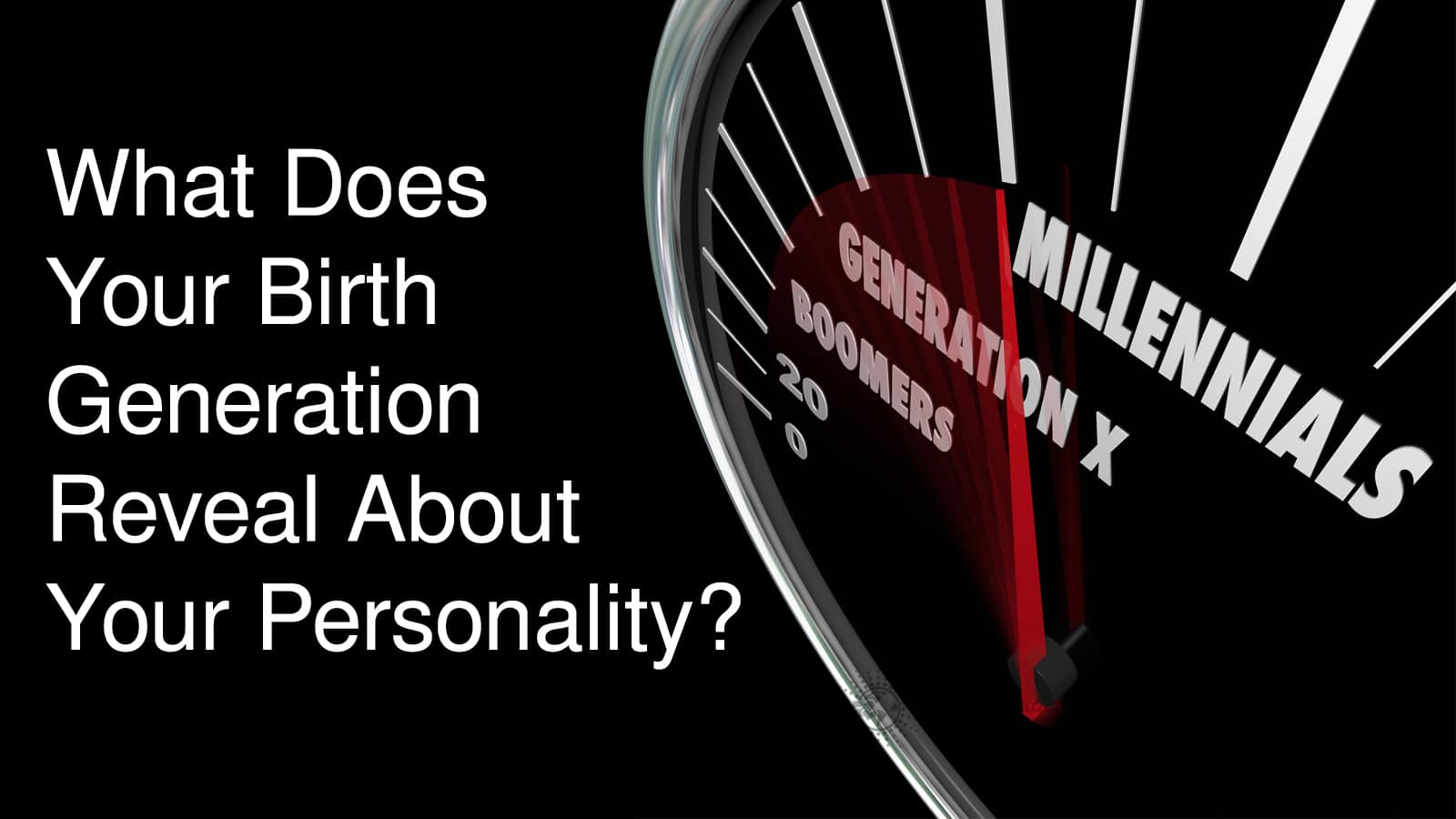Many things affect one’s personality. But did you know that your birth generation also says a lot about your characteristics and tendencies?
For example, multiple studies done on people born in Generation Y have found them to require more “me” time and flexibility on the job and put more emphasis on extrinsic rather than intrinsic values. While many regard them as narcissistic, lazy, and unproductive, others see them positively. Other words and phrases to describe people from this generation include “upbeat, liberal, open to new ways of living, and open-minded.”
No matter your opinion on this generation, people born between 1981-2000 have certain characteristics that, in some ways, define them. In the same way, other generations have traits that also describe the group as a whole. To find out what your generation of birth says about you, keep reading below.
What Does Your Generation of Birth Reveal About Your Personality?

Traditionalists (1900-1945)
People born during this period may have experienced much hardship growing up due to the Great Depression and World Wars I and II. However, they later relished their prosperity. They value family and community and believe in hard work, respecting authority, and doing a good job no matter what.
Core values:
Adhering to rules, conforming, contributing to society positively, dedicated, delayed rewards, discipline, don’t question authority, duty before pleasure, family, giving back to the world, hard work, following the law, loyalty, patriotism, patience, respecting elders and authority, responsibility, saving money, stable living, trust in government
Attributes:
Committed, competent, confident, conservative, dedicated, making the most of the situation, ethical, frugal, hard work, value history, honor, linear thinking and working, loyal to company and duty, patriotic, organized, respecting authority, following rules, sacrifice, strong work ethic, task-oriented, thrifty, saving money, trusting hierarchy
Baby Boomers (1946 – 1964)
People born during this time believed wholeheartedly in “The American Dream,” and wanted to work hard to achieve their goals. Many saw them as greedy, ambitious, and materialistic. WWII influenced their beliefs and values and made them more skeptical of blindly following authority.
Core values:
Anti-war, anti-government, anything is possible, equal rights and opportunities, loyal to family, involved in the community, optimistic, personal gratification, personal growth, question authority, spend generously, don’t think about the future, teamwork, transformational, don’t trust authority, youth, work, make a difference
Attributes:
Able to handle a crisis, ambitious, anti-establishment, challenge authority, competent, competitive, consensus leadership, consumerism, ethical, great communication, idealist, loyal to career and employer, most educated generation thus far, multi-tasking, rebellious, life/work balance, optimistic, politically correct, strong work ethic, responsible
Generation X (1965 – 1980)
This generation grew up amid hard times. That’s because they were the first generation NOT to do as well financially as their parents did. They also had to watch many political scandals unfold, and financial crises arise, and they usually grew up in a household where both parents worked. They questioned authority and governments more than any previous generation.
Core values:
Balance, diversity, entrepreneurial, fun, highly educated, high career expectations, independent, informal, no loyalty to companies or workplace, pragmatic, self-reliant, skeptical, cynical, non-conformity, technologically literate, global thinking
Attributes:
Adaptable, angry for no reason, anti-establishment, anti-government, anti-corporations, the big gap with baby boomers, can-d0 attitude, make a difference in the world, independent, confident, competent, flexible, ethical, focus on results, free agents, the highest amount of divorced parents, brand loyalty, ignore leadership, self-reliant, self-starters, pampered, results-driven, entitled, not impressed by authority, willing to take on responsibilities, flexible work/life balance, willing to work hard
Millennials (1981- 2000)
Much negativity exists in the world in regard to this generation. But they have grown up in turbulent times (ex. 9/11, The Great Recession, school shootings, etc). The greatest technological expansion happened during their childhood, which shaped their future and ways of looking at the world. Their parents sheltered them greatly from the evils of the world. This generation wants to make a big difference as they see how many things need fixing in our world today.
Core values:
Achievement, consumerism, civic duty, confidence, fun, high morals, tolerant, competitive, enjoy self-promotion and attention, self-confident, sociable, globally conscious, most educated generation, techno-savvy, spiritual, instant gratification, wanting more from life, realists, street smart, optimistic
Attributes: ambitious but scatterbrained, look to the workplace for direction in life, teamwork, attached to personal items and gadgets, sheltered by parents, well-educated, confident, diverse, multicultural, the computer age, techno-savvy, fiercely independent, family-focused, wanting to change the world, scheduled life, globalism, seeking out fun experiences, short attention span, politically savvy, optimistic, “me first” attitude, self-absorbed, digital generation, open to new ideas, sociable, makes friends easily, consider parents as heroes, innovative, patriotic, non-conformists, question authority, free-spirited, question everything, entitled
Generation Z (1997-2012)
Generation Z is the most tech-savvy of any generation. Their world has always included computers and smartphones. They cut their teeth on social media sites, spending time on a personal screen since they were old enough to hold a device. They’re multi-taskers, able to switch back and forth between apps to watching movies to sending a quick text to their friends while doing their homework. Interestingly, their ability to do this has resulted in them having shorter attention spans than Millenials.
Diversity is important to Gen Z, and they have little patience for race, sexual orientation, or gender inequality. They’re activists pushing for justice and social equality, similar to the Boomer generation. Generation Z struggles more with mental health problems than prior generations. Many in this group say they struggle with moderate stress, anxiety, and depression. Some say that FOMO (fear of missing out) heightened by social media contributes to this generation’s stress.
Generation Z individuals are products of the post 9-11 world, political polarization, foreign wars, and economic erratic changes. They see negativity, failures of former heroes, and idolized figures fall, scandals erupt within the church, public and private schools, and the legal system. Their world has never felt safe.
On the other hand, they saw a tremendous change. They saw the swearing-in of the first African American president and the legalization of gay marriage. Their parents used technology to track them and their academic progress without seeing actual papers. It’s no wonder this generation is skeptical of authority and established traditions.
Gen Z students prefer a do-it-yourself (DIY) style of learning because they have multiple places where they can get their information. Information is just one hyperlink away for them. But this makes it harder for this generation to distinguish facts from online opinions.
Core values:
Generation Z’s characteristics: are hardworking, value social equality and justice, independence, value authenticity. They’re pragmatic, less apt to take risks, especially financially, entrepreneurial, enjoy being with people, and are competitive. Genz likes change and wants to be heard by others. They’re inclusive of others, super health-conscious activists, and extremely private. This generation is a more diverse group of people. More plans to enroll in college than any other generation. But they also say they are lonely more than any other generation. When asked, a Gen Z individual says climate change is the number one problem they want to fix.
Other names for Generation Z:
iGeneration, Homeland Generation, Net Gen, Digital Natives, Neo-Digital Natives, Pluralistic Generation, Internet Generation, Centennials, Zoomers, or Post-Millennials.
Final Thoughts on How Your Birth Generation Impacts Your Personality
Everyone worries about whether the next generation will do a good job of caring and contributing to the world.




















